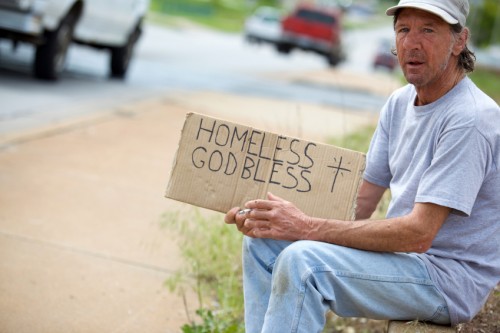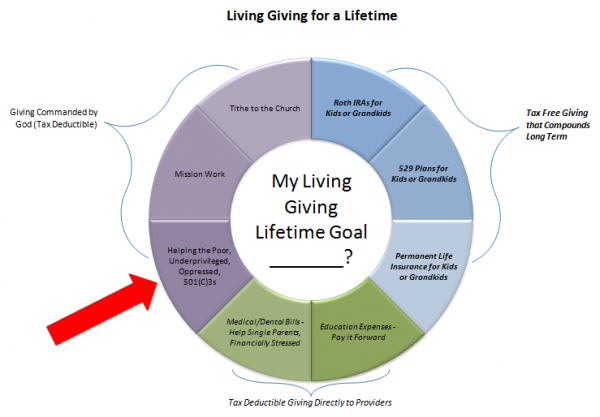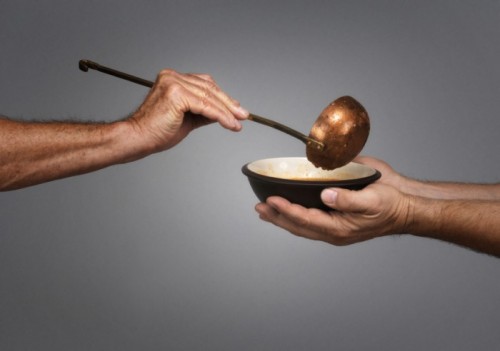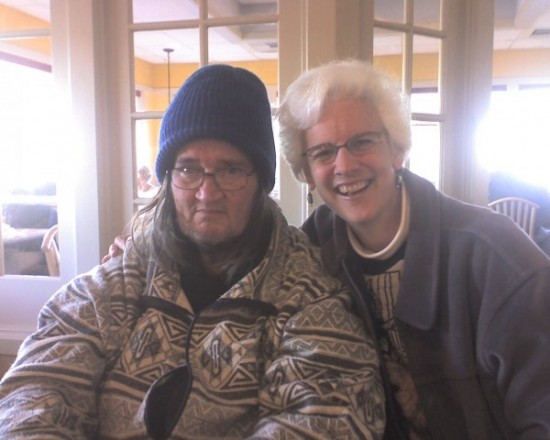Recently I was sitting at a traffic light when I noticed an underprivileged woman on the corner holding a sign that read, “Anything helps. God Bless.” Because I was out of granola bars, I reached for a dollar in my wallet. When I rolled down my window, she flashed a smile of appreciation. As I handed her the dollar, I shared my standard pitch, “This dollar is not from me, but from Jesus. I hope you will spend it wisely.” Without skipping a beat she said, “Jesus is my Savior, and I am saving these dollars to pay next month’s rent.”
I don’t profess to be an expert on ministering to the poor. I struggle with how to help them effectively as much as the next person. As Christians, I doubt we disagree about our duty to assist the poor, but how we go about it is another matter. Giving to the poor is part of my living giving vision.
I offer three biblical reasons why our living giving plan should include the poor.
#1: God said so.
“Give generously to him and do so without a grudging heart; then because of this the Lord your God will bless you in all your work and in everything you put your hand to. There will always be poor people in the land. Therefore, I COMMAND you to be openhanded toward your brothers and toward the poor and needy in your land. — Deuteronomy 24:10-11
Throughout the New Testament, you will find passages in which God places high value on the poor. Examples include “remember the poor,” and Tabitha “was always doing good and helping the poor,” and Cornelius “was God-fearing and gave generously to those in need.”
#2: Jesus expects us to remember how merciful He was to us, which should motivate us to be merciful to those in need without judging them.
Luke 6:27-38: Jesus teaches us how to love the unlovable, i.e. love your enemies, do good to those who curse or hate you, and lend without expecting repayment. He even says “Give to everyone who asks you.” Why? He gives an admonition, “Be merciful, just as your Father is merciful. Do not judge, and you will not be judged.”
Jesus showed us mercy when we deserved to be condemned. When the poor need help, He wants us to demonstrate His mercy and generosity without judgment.
#3: Jesus believes that when we ignore the poor and needy, we have ignored Him.
Matt 25:34-40: This passage describes Judgment Day. The first three verses describe Jesus affirming the righteous for giving Him food, water, and clothing when He was in need. The last four verses describe the righteous trying to recall when they gave Him these provisions. Jesus said, “I tell you the truth, whatever you did for one of the least of these brothers of mine, you did for me.”
Jesus deeply cares for the poor. It is so important to Him, that we will be held accountable for our actions toward the poor on Judgment Day.
WHERE DO WE GO FROM HERE?
God expects us to take care of the poor, but I feel challenged by how to do this effectively. Don’t you? How do we give generously in a culture in which we are segregated by socioeconomic classes? How do we reach across those barriers when the primary times we cross paths with the poor are at a signal light or on a mission trip? How do we make meaningful connections with people in need? Moreover, how do we make this a part of our living giving plan?
Here are some opinions I’ve heard among Christians about how or how not to help the poor:
- If we give money to a homeless man, he is going to buy alcohol with it. How is that helping the poor?
- Handing money to a poor person is not solving the problem of poverty. We are rewarding their choice to panhandle.
- Communities have places set up to provide meals and shelter for the poor. We should encourage them to seek assistance there.
- When we give our tithe to the church, a portion of the money is sent to organizations that help the poor. Therefore, I am fulfilling the requirement to help the poor.
None of these points exempt us from looking the other way when a person is asking for help on the corner. When I read a passage from Deuteronomy about being “openhanded” or giving “without a grudging heart,” I can’t ignore my responsibility. Furthermore, if we adopt the premises shared above, we ultimately foster a pattern Jesus doesn’t favor – keeping the poor at a distance.
Of course, how I chose to help the woman on the street corner prevails as the least popular approach among the brethren! I typically have non-perishable food in the car to give away. However, this is the most obvious daily opportunity I have to create a meaningful connection with the poor. And if we are honest, giving a dollar doesn’t make a dent in our wallet when we don’t have food to give away. Why begrudge them? Who are we to judge them?
For those looking for an entry point, let me offer some ideas to help the poor as part of your living giving plan:
- Create a line item in your budget entitled “Helping Those in Need” and determine a set amount to give each budget cycle. Then be intentional by praying for the opportunity to serve the poor directly. Ask the Lord to reveal persons in need so you know who should receive the amount you’ve set aside to give. I have been doing this for the last five years, and it is amazing how God answers this prayer!
- If your church has a ministry to feed the poor, get involved. If not, then meet with the director of your local soup kitchen and volunteer to help serve meals. When you are finished serving the food, then sit at the table with them and make a connection. Learn a little bit of their story, and come back regularly so you can cultivate a relationship with them.
My friend, Barb, and I did this for over a year in Hutchinson, and five years later, we still share a friendship with a sweet woman named Bessie. She still calls us for prayer support, or when she’s lonely.
THE REWARD FOR HELPING THE POOR AND NEEDY
I invite you to implement one of these ideas. Let me encourage you with these passages from Proverbs:
- Prov 19:17 “He who is kind to the poor lends to the Lord, and he will reward him for what he has done.”
- Prov 22:9 “A generous man will himself be blessed, for he shares his food with the poor.”
- Prov 28:27 “He who gives to the poor will lack nothing.”
Here’s the bonus:God’s living Word is intended to be transformational, not informational. When we act on the information, the poor is blessed, but we are the ones who are transformed! Our hearts grow to be more like Jesus. Because we are made in His image, our generosity to the poor reflects Him. We share His joy when we tangibly make a difference in the life of another. It is my prayer that you will incorporate helping the poor in your living giving plan.
What is your greatest struggle to help the poor in more meaningful ways beyond sending money as a charitable gift? If you are helping the poor that includes connecting with them directly, please share a comment below on how you’re doing it to inspire the rest of us!
Blessings,
Lee Ann





Personally, I believe there is an alternate way to help the woman standing on the street corner collecting money to pay next month’s rent. That is a hand-out…a hand-up gives the person a better gift. Expecting ‘others’ to provide her needs makes her helpless & dependent. She could be encouraged to help herself; to be a waitress, start cleaning houses, or do something, for an income. That way she develops skills, dependability, trustworthiness, & confidence. The first woman I saw on a street corner, I asked her if she would clean my house; she replied “I could, I guess”. She said that she was on that corner daily, but I knew better because it was near where I lived. Never was she on that corner again! Another woman on that same corner is overweight & with two dogs, holding a “HUNGRY” sign. I chatted with her at the red light…the dogs were well taken care of by an agency; why had the agency not referred her to “Meals on Wheels” or a soup kitchen? She obviously wants money for something else! Don’t fall for what you see! Police will tell you not to ever give them money.
Murlene
Murlene,
I appreciate your taking the time to engage this difficult subject (or at least it is for me!). You have reinforced that how I handled my encounter with the woman on the street corner is the least favored approach among my brethren! Thanks for giving me a chuckle.
When someone is asking for help on a street corner, I usually have a granola bar to give them. But if I’m out, I have to ask myself “What is my responsibility at this moment?” At a signal light, I only have a minute or so to act. I don’t have a problem giving them a dollar just to help them along. And the reason I’m okay with it is because I have difficulty landing on “She obviously wants money for something else.” I honestly don’t know that, nor can I judge that. Second, I am reminded of the passage in James 2:15-16, “Suppose a brother or sister is without clothes and daily food. If one of you says to him, “Go, I wish you well; keep warm and well fed,” but does nothing about his physical needs, what good is it (faith)? So I have erred to the side of “giving to anyone who asks.”
As I mentioned in my post, a friend of mine and I went to the soup kitchen weekly for a year and intentionally cultivated a friendship with Bessie and a few others. I can tell you that we were among people who showed strong signs of mental illness. Because we looked so “different” from them, they would hardly make eye contact with us, though we tried to connect with them. Over that year I really learned the importance of not judging them. They are hurting. They need to know someone cares. They already feel invisible by how most people treat them. I can’t tell you how many times I watch the head of the driver in front of me look straight ahead without even attempting to smile at the person on the corner or acknowledge them. That bothers me.
It is entirely possible that I am steps behind many of my brothers and sisters in Christ like yourself. Maybe I am missing something. But until that “something” is revealed, why begrudge them a granola bar or a dollar? I don’t feel I can judge them. The reality is that I have a daily opportunity to bring the light of Christ to someone. This small gesture of handing out a granola bar or dollar helps me fulfill the command to be “open-handed” and to “give without a grudging heart.”
I hope others will share their thoughts. There is much we can learn about effectively helping the poor.
Blessings,
Lee Ann
The granola bar is wonderful! I one time handed out my left-over food from having eaten at a restaurant nearby where a young woman was standing on a corner at 2222. She started eating it immediately.
Another time I handed out my left-overs to a woman standing on 183 N, who was most appreciative.
My nephew in the metroplex of D-FW took a hamburger with $100 bill in it to the man on the corner, then stayed nearby to see what he did with it…threw it away…he wanted money obviously, so my nephew went back, took the $100 bill out of the burger, told the man that he was sorry that he wasn’t hungry!!! (as his sign said) Fact? I don’t know.
I asked a man on the corner as I waited on the red light one time long ago, that I would go to Albertson’s (right there) get him a plate lunch & bring it to him, but he said “Oh, I am more worried about my ‘ole lady that anything.”
Another time, my friend had a bleeding heart for such people, so I said “Let’s go over get a plate for him from Albertson’s & bring it back to him” …we did, but he had disappeared!
An Indian young man used to sit on that corner with drawings…I asked him if he was trying to get home (to N.M?)No, he lived in Austin, just down on his luck, but his sign said nothing about help, but he told me once that a man gave him $20 for his Indian sign. I confronted him once at the red light, asking him what the Great White Father thought of him, using all those drugs, ruining his health, etc….which he denied, of course, but I had observed his appearance from being a healthy looking young Indian to his clothes hanging on him, loosing his teeth, becoming aged…all signs of drug usage. I have no empathy for such people…just look what they could be doing instead of standing on a corner begging; they need inspiration to help themselves instead of a hand-out.
I told an older man once at the corner of 183 & 360 that Apple was building a new plant in Austin & that they were hiring…do you think he helped himself? Nope, he is still on that corner, usually on the week-ends. I’ve often wondered who delivers them to those corners.
Murlene
Thanks again for adding more of your thoughts on this issue, Murlene. I am impressed with the different ways you’ve attempted to help someone on a street corner. It certainly goes beyond my granola bars! I think one of the bigger challenges for me is to not become calloused or insensitive toward them. There are some on the street corner who are illiterate, so the idea of filling out an application for a job at Apple wouldn’t be viable. I met another fellow on the street corner, and when I asked if he stayed at a shelter, he said, “Not on my life. I would rather sleep in the woods with ants than spend the night in the shelter. There are stabbings at the shelter, which make it a dangerous place to be.”
I don’t doubt there are people who are cons or who are trying to manipulate us, and if I had the ability to judge who was deceiving me, I obviously wouldn’t participate. BUT, I don’t have that ability, and not everyone on the street corner is a con. For example, I now see Nancy, a former server at Luby’s, now on the street corner. She is a great lady and has a wonderful heart. But her husband lost his job, and she had left Luby’s to help him. He lost his job because his boss was found guilty of embezzling money, so this transportation business folded. I think most of us can share times they helped someone and felt conned, and we can also share times that we know for sure we helped them, i.e. the lady who ate your leftovers.
I still vote for erring to the side of compassion, being open-handed, and giving without a grudging heart or a judging heart.
Blessings,
Lee Ann
The phrase ”when you are asked” jumps out at me. I have been asked personally in two parking lots for money. I didnt give and now wish that i had, because they asked it of me, It was a personal encounter. Also, when I see a man with no legs or crippled in a horrible manner, I give because if they want alcohol or drugs, then let them go for it; anything helps.
Bobbie
Bobbie,
I appreciate your thoughts on this. You reminded me that I, too, have been approached in a parking lot before getting in my car. It does feel uncomfortable, but I didn’t regret helping someone along. This person went out of their way to give me a contact name at a local church that I didn’t ask for to let me know she’s not a typical panhandler.
I also agree that they can spend their handout however they need to. God has given us free will to spend His resources however we choose, but of course, he will hold us accountable as to whether we were “good stewards (managers)” of His money. Similarly, He will judge the underprivileged or poor for how they use His resources as well. If they blow it on alcohol, they will eventually give an account.
Blessings,
Lee Ann
Blessings,
Lee Ann
I sure don’t want to ever be approached in a parking lot! I shall share one other experience with you: the man was sitting on 183 with a sign saying “Need 25 cents (the emblem for cents) for hamburger” I gave him the quarter with “Be sure you spend it on a hamburger, not drink” so he handed it back and said “Lady, you can keep your quarter.”
Murlene